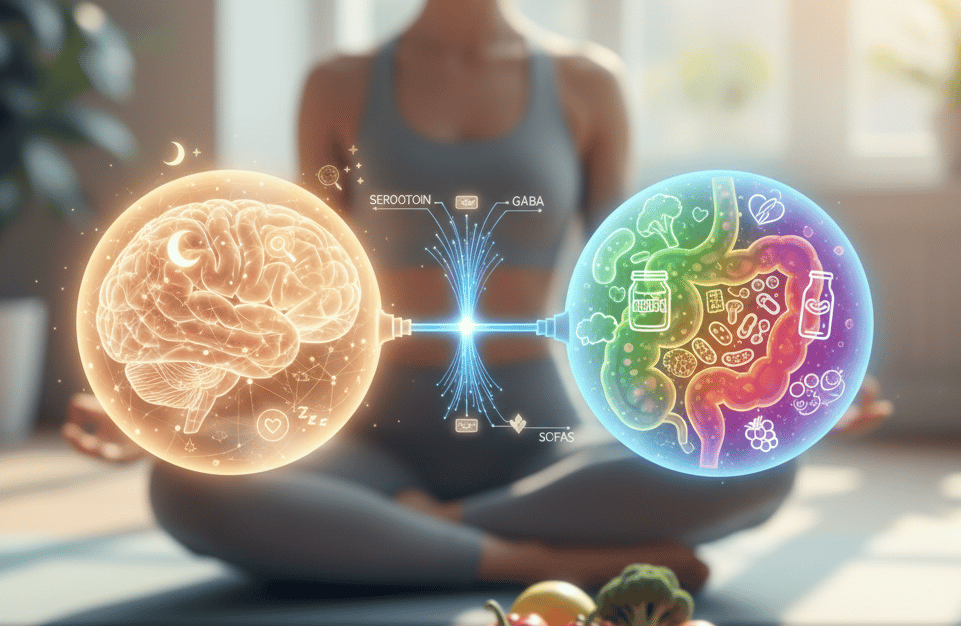The Second Brain Connection: How Your Gut Health Influences Mood, Focus, and Stress
Have you ever felt "butterflies in your stomach" before a big presentation, or a wave of nausea when receiving shocking news? That isn't just a quirky figure of speech—it's your gut and brain having a conversation. This conversation happens along the Gut-Brain Axis (GBA), a critical, two-way communication system that connects your digestive tract and your central nervous system.
The Science of the "Second Brain" (The Enteric Nervous System)
While your brain in your skull is the undisputed control center, your gut hosts its own complex nervous system, often dubbed the "second brain."
A. What is the ENS?
The lining of your digestive tract is home to the Enteric Nervous System (ENS). This complex mesh of neurons extends from the esophagus all the way to the rectum. It is so vast that it contains hundreds of millions of neurons—more than the entire spinal cord—and can operate autonomously to control digestion.
B. Chemical Conversations: Neurotransmitters
The gut is not just a passive digestive tube; it's a major chemical manufacturing plant. It produces many of the same neurotransmitters that your brain uses to regulate mood and thought:
Focus on Serotonin: Amazingly, up to 90% of the body's serotonin—the key "happy chemical" that influences mood, sleep, and appetite—is produced and stored in the gut. While this gut-produced serotonin doesn't cross the blood-brain barrier directly, its production and signaling within the GBA are essential for overall regulation.
The gut also helps produce precursors for other vital brain chemicals, like GABA (the main calming neurotransmitter) and Dopamine, influencing how we experience relaxation and reward.
C. The Vagus Nerve Highway 🧠↔️ T
The primary physical link between the ENS and the brain is the Vagus Nerve, the longest cranial nerve in the body. The Vagus Nerve acts like a crucial, high-speed information highway, constantly sending data about the state of your digestive system directly up to the brain. Calming the Vagus Nerve, often through deep breathing or yoga, can directly influence both your digestion and your mood.
The Microbiome's Mental Impact: Tiny Inhabitants, Big Influence
The ultimate conductor of the gut-brain orchestra is your gut microbiome—the trillions of bacteria, fungi, and viruses living in your large intestine. The composition of this microbial community has a profound impact on your mental state.
A. The Short-Chain Fatty Acid (SCFA) Link
When your beneficial gut bacteria ferment the fiber you eat, they produce beneficial chemicals known as Short-Chain Fatty Acids (SCFAs), like butyrate. These SCFAs have a dual role:
They are the primary fuel source for the cells lining your colon.
They travel through the bloodstream and are essential for brain health, supporting memory, reducing inflammation, and maintaining the integrity of the protective Blood-Brain Barrier (BBB).
B. Mood and Stress Regulation
An imbalanced microbiome (known as dysbiosis) can lead to chronic, low-grade inflammation throughout the body.
This inflammation triggers a heightened stress response, leading to the excessive release of stress hormones, such as cortisol.
High cortisol and inflammation can damage the delicate gut barrier, potentially leading to a "leaky gut." A compromised barrier sends distress signals back up the Vagus Nerve to the brain, trapping the individual in a negative stress loop.
Impact Areas: What GBA Dysfunction Looks Like
When the lines of communication along the GBA are disrupted, it doesn't just manifest as digestive issues; it affects your entire cognitive and emotional landscape.
Mood Disorders: Imbalances in the microbiome are increasingly linked to changes in neurotransmitter levels, contributing to symptoms of anxiety and depression.
Cognitive Fog: Inflammation that starts in the gut can travel, causing neuroinflammation. This often results in reduced focus, difficulty concentrating, and generalized "brain fog."
Sleep Quality: As the gut is a major producer of serotonin, and serotonin is a precursor to the sleep hormone melatonin, an unhealthy gut can disrupt the natural cycle needed for restful, restorative sleep.
What to do: Strengthening Your Gut-Brain Axis
The good news is that you have direct control over the health of your GBA. Here are four simple, powerful steps you can implement today:
A. Prioritize Fiber (Prebiotics)
Action: Eat a wide variety of colorful, high-fiber foods: vegetables, fruits, legumes, and whole grains.
Reasoning: These foods contain prebiotics—the essential non-digestible fibers that act as "food" for your beneficial gut bacteria, helping them thrive and produce more brain-boosting SCFAs.
B. Embrace Fermented Foods (Probiotics)
Action: Incorporate live, fermented foods into your diet, such as yogurt with live active cultures, kefir, sauerkraut, kimchi, and kombucha.
Reasoning: These foods introduce beneficial, live bacteria (probiotics) directly into your system, which can help increase the diversity and resilience of your existing microbiome.
C. Manage Stress Intentionally
Action: Incorporate mindful activities like deep, diaphragmatic breathing, meditation, or gentle yoga into your daily routine.
Reasoning: These practices directly stimulate and calm the Vagus Nerve, instantly lowering your stress response and promoting a healthier environment in your gut.
D. Sleep Consistency
Action: Maintain a regular sleep schedule, even on weekends.
Reasoning: Sleep deprivation is a physiological stressor that negatively impacts the balance of your microbiome and disrupts the synthesis of key hormones.
VIVher Discover is committed to providing unbiased, evidence-based information. Please note the following:
Not Medical Advice: The information provided in this article ("The Supplement Scorecard: What Women Really Need to Fuel a Thriving Life") is for educational and informational purposes only. It is not a substitute for professional medical advice, diagnosis, or treatment.
Consult Your Doctor: Always seek the advice of a qualified healthcare provider or registered dietitian before beginning any new diet, fitness routine, or supplement regimen, especially if you are pregnant, nursing, taking medications, or have a pre-existing medical condition (such as iron overload).
No Sponsorship: VIVher Discover does not receive any direct sponsorship, advertising revenue, or compensation from the brands or products mentioned in this article. Our recommendations are based solely on editorial research and scientific merit.


